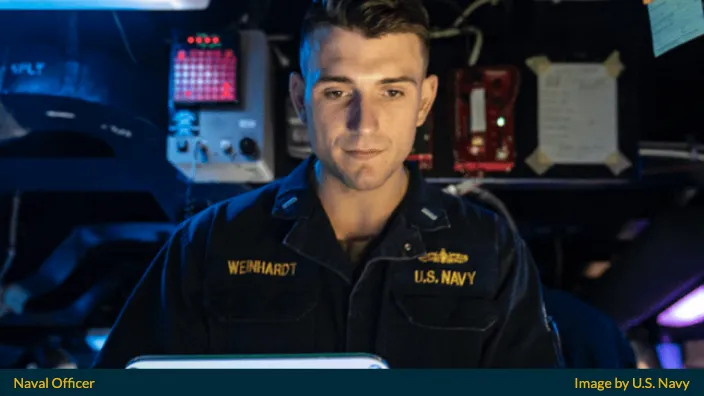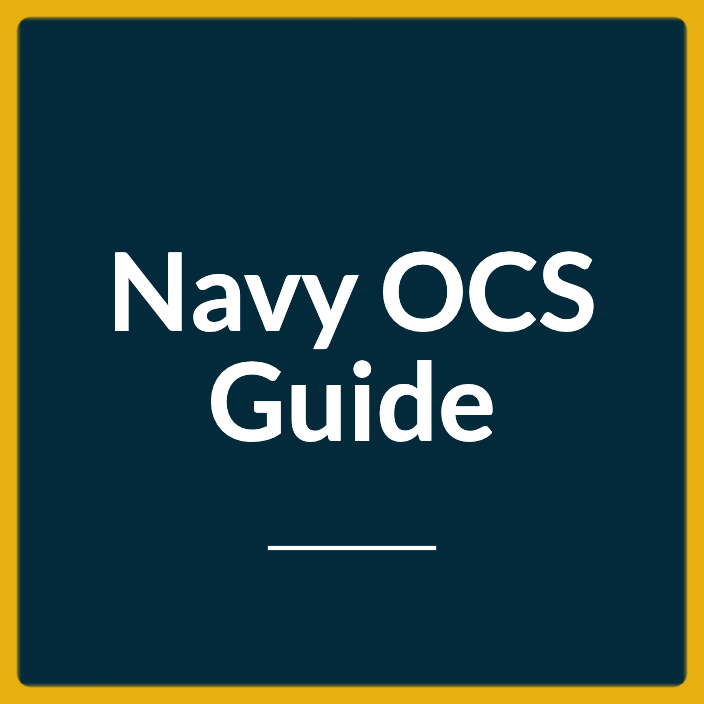Last Updated on March 5, 2024
This guide provides helpful information for Navy Enlisted personnel who wish to get a commission through the Unrestricted Line Officer In-Service Procurement Program (URLO ISPP) during Fiscal Year 2024.
The pilot URLO ISPP offers active-duty enlisted members who satisfy qualifying criteria on a path to officer commissions in all Unrestricted Line Officer communities.
Unrestricted Line Officer
An unrestricted line officer in the United States Navy is a commissioned officer who has been trained and qualified to command a ship or submarine. They handle the safety, security, and operational readiness of their vessel and crew.
Unrestricted line officers are typically assigned to surface ships, submarines, or aviation squadrons. They must have a four-year college degree from an accredited institution and complete Officer Candidate School.

To learn more, read: Navy Unrestricted Line Officer Programs
Basic Application Requirements
The basic requirements for applying for the URLO ISPP are listed below. The information is current per Navy Personnel Command as of November 2023. No updates have been issued this far.
| Citizenship | Applicants must be citizens of the United States. |
| Gender | There are no gender restrictions for this program. |
| Age | Applicants must be at least 18 years old and not older than the maximum age restriction for the designator for which they are applying. |
| Education | Because of the nature of the URLO ISPP, applicants must have a baccalaureate degree. Besides any other curricular requirements, the grade point average must meet the minimal requirements specified in the specific designator Program Authorization. |
| Medical | For officer appointment, applicants must meet the pre-commissioning/accession physical norms. These physical specifications are established under the Program Authorization for the specific designator for which they will be accepted. |
| Aptitude | Candidates for aviation positions must have a minimum Aviation Selection Test Battery (ASTB) score under the program authorization for the specific designator for which they are applying. The Officer Aptitude Rating (OAR) must meet the minimal parameters specified in the Program Authorization for the relevant designator. |
| Behavior | Applicants must be of good moral character and have no history of disciplinary action under Article 15 of the Uniform Code of Military Justice, no court-martial convictions, no civilian felony convictions by any civil court, or misdemeanors (except minor ($300 or less fine) traffic violations) within the three years prior to selection. An offense involving driving under the influence of an intoxicant (DUI/DWI, etc.) constitutes a major traffic violation and is disqualifying if committed within four years of the selection date. Pre-service drug or alcohol usage is not an automatic disqualifier. Any substantiated in-service drug or alcohol abuse (record of either, regardless of date) will cause disqualification. |
| Physical Fitness | To be eligible for Officer Candidate School (OCS), applicants must have passed their most recent PFA with an overall score of at least “Excellent”. If no official PRT scores are available, a mock PFA performed by a competent Command Fitness Leader will suffice. Running the PFA is mandatory because there are no other cardio options at OCS. |
| Time in Service | The Commanding Officer’s sound judgment, observation, and evaluation of candidates is required for this Program Authorization. As a result, a minimum of six months of service is necessary. |
| Warfare Qualification | Applicants are not required to have completed their warfare qualification. The lack of a warfare qualification will not be looked negatively by the selection board. |
Nuclear-Trained Sailors
When applying to a non-nuclear officer commissioning program, sailors assigned to a nuclear training command or who carry a nuclear Navy Enlisted Classification (N1XX/N2XX) must receive a conditional release from nuclear field duty.
A Sailor must file an Enlisted Personnel Action Request (NAVPERS 1306/7) to the Nuclear Propulsion Program Management Branch (OPNAV N133) via their detailer at Navy Personnel Command, Enlisted Submarine/Nuclear Power Assignments Division to gain a conditional release (PERS-403).
Before applying for a non-nuclear officer program, applicants must receive a conditional release.
Conversely, all conditions of Program Authorization 100A must be met by Sailors applying for appointment to the nuclear propulsion officer candidate (NUPOC) program.
Application Process
Nominations must come from a command that has completed the basic training pipeline and must be made at the Commanding Officer (CO) level, with approval from the first Flag Officer in the CO’s chain of command.
Nominations from the first training stream will be rejected. The nominating CO and the supporting Flag Officer do not have to be URL officers.
Applicants must be nominated positively by the CO’s Recommendation portion of the Officer Programs Application, OPNAV 1420/1.
This program is open to active duty enlisted Sailors. This program is not available to members of the Full-Time Support, Individual Ready Reserve, or Selected Reserves who are on Active Duty for Special Work (ADSW), Active Duty for Training (ADT), one-to-three year recall, or Canvasser Recruiter duty.
Determine that all sections have been completed and that the applicant fits all eligibility conditions.
The CO’s endorsement must include the following items:
- a statement showing whether the applicant is serving on full duty without restriction;
- a statement showing that the applicant meets physical fitness and body fat percentage standards; and
- a statement addressing any negative performance evaluation data and positive steps taken by the applicant to address these performance issues.
The “Well-Qualified Applicant Profiles” found in certain designator-specific Program Authorizations outline the criteria and measurable attributes that the program uses to identify the ideal candidates for commissioning.
These guidelines are intended to provide a clear benchmark for the qualities and qualifications that prospective Sailors should possess to be considered well-suited for the program.
Nominations will be forwarded by the CO to the first Flag Officer in their chain of command for approval.
If all parties agree, the first Flag Officer will transmit the nominations and endorsement to NRC.
The NRC will assess nominations to ensure that all program authorization requirements are completed.
If a nomination is incomplete, ineligible, or the designator is closed owing to filling available quotas, the NRC will reject it.
In these circumstances, the nominations will be returned to the originating command, and the initial Flag Officer will be alerted of the inconsistency that prohibited further processing.
Complete nomination packets will be forwarded to BUPERS-31 for consideration at URLO ISPP selection panels by the NRC.
At least quarterly selection panels will be held, or in combination with scheduled URL Professional Recommendation Boards.
Given the demonstrated proclivity to serve, completion of an undergraduate degree and a Navy enlisted training pipeline, as well as the support of the CO and first Flag Officer, URLO ISPP selection panels will normally select all qualified candidates, giving them priority over other applicants seeking a commission through the URL PROREC process.
If the URLO ISPP selection panel determines it is quota constrained, BUPERS-3 must connect directly with OPNAV N-13 to request more quotas in situ. Normally, N-13 will provide additional quotas.
Following the URLO ISPP selection panel, CNRC will contact selected candidates and process their applications to attend OCS.
There are no waivers allowed to receive a commission through the URLO ISPP.
Upon Selection
All selected candidates must attend Officer Candidate School (OCS) in Newport, Rhode Island.
Navy OCS is a 12-week program designed to prepare college graduates for service as commissioned officers in the US Navy.
The program includes physical training, leadership development, and instruction in naval customs and traditions.
Upon successful completion of OCS, candidates are commissioned as Ensigns in the U.S. Navy and assigned to their first duty station.
If a candidate cannot finish OCS successfully for any reason other than injury, he or she will be returned to their previous command at their existing rank/rate.
The program authorization for the specific designator for which they will be accepted will govern any subsequent training.
Enlisted applicants in pay grades E-4 and lower who are chosen for this program are designated officer candidates and are advanced to or assigned the rank of E-5 upon reporting to OCS.
Enlisted applicants in paygrades E-5 and higher are considered officer candidates and will stay in their current paygrade until commissioning.
Candidates will be commissioned as Ensigns in the United States Navy’s Unrestricted Line (URL). The candidate’s application and selection will determine the designator.
Service Obligation
All officers are required to serve an eight-year term (Title 10 U.S. Code section 651).
This commitment will be fulfilled through a combination of active and reserve service, with a minimum active service obligation of four years or the length stated in the individual program authorization, whichever is greater.
Officers commissioned under this program will not be eligible for lateral transfer until they have completed the minimum service requirements.
If a higher duty is needed by the program authorization for the specific designator for which the candidate has been approved, that obligation will apply.
Prior enlisted military members with qualifying records are designated and paid at the O-1E paygrade.


